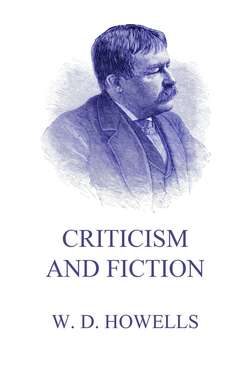Читать книгу Criticism And Fiction - William Dean Howells - Страница 13
IX.
ОглавлениеI would have my fellow-critics consider what they are really in the world for. The critic must perceive, if he will question himself more carefully, that his office is mainly to ascertain facts and traits of literature, not to invent or denounce them; to discover principles, not to establish them; to report, not to create.
It is so much easier to say that you like this or dislike that, than to tell why one thing is, or where another thing comes from, that many flourishing critics will have to go out of business altogether if the scientific method comes in, for then the critic will have to know something besides his own mind. He will have to know something of the laws of that mind, and of its generic history.
The history of all literature shows that even with the youngest and weakest author criticism is quite powerless against his will to do his own work in his own way; and if this is the case in the green wood, how much more in the dry! It has been thought by the sentimentalist that criticism, if it cannot cure, can at least kill, and Keats was long alleged in proof of its efficacy in this sort. But criticism neither cured nor killed Keats, as we all now very well know. It wounded, it cruelly hurt him, no doubt; and it is always in the power of the critic to give pain to the author—the meanest critic to the greatest author —for no one can help feeling a rudeness. But every literary movement has been violently opposed at the start, and yet never stayed in the least, or arrested, by criticism; every author has been condemned for his virtues, but in no wise changed by it. In the beginning he reads the critics; but presently perceiving that he alone makes or mars himself, and that they have no instruction for him, he mostly leaves off reading them, though he is always glad of their kindness or grieved by their harshness when he chances upon it. This, I believe, is the general experience, modified, of course, by exceptions.
Then, are we critics of no use in the world? I should not like to think that, though I am not quite ready to define our use. More than one sober thinker is inclining at present to suspect that aesthetically or specifically we are of no use, and that we are only useful historically; that we may register laws, but not enact them. I am not quite prepared to admit that aesthetic criticism is useless, though in view of its futility in any given instance it is hard to deny that it is so. It certainly seems as useless against a book that strikes the popular fancy, and prospers on in spite of condemnation by the best critics, as it is against a book which does not generally please, and which no critical favor can make acceptable. This is so common a phenomenon that I wonder it has never hitherto suggested to criticism that its point of view was altogether mistaken, and that it was really necessary to judge books not as dead things, but as living things—things which have an influence and a power irrespective of beauty and wisdom, and merely as expressions of actuality in thought and feeling. Perhaps criticism has a cumulative and final effect; perhaps it does some good we do not know of. It apparently does not affect the author directly, but it may reach him through the reader. It may in some cases enlarge or diminish his audience for a while, until he has thoroughly measured and tested his own powers. If criticism is to affect literature at all, it must be through the writers who have newly left the starting-point, and are reasonably uncertain of the race, not with those who have won it again and again in their own way.
